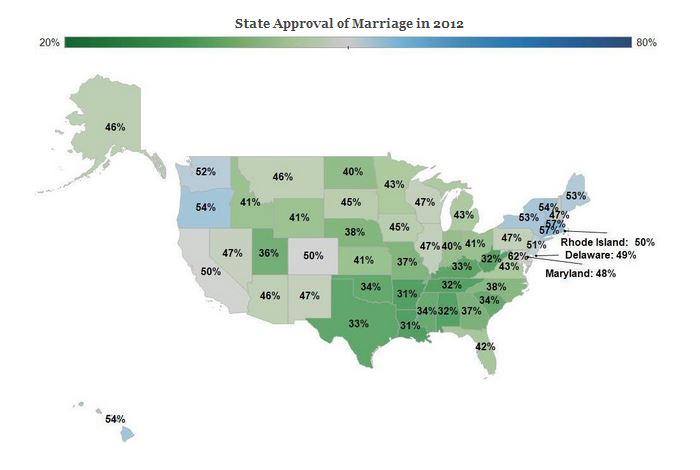
The Supreme Court of the United States' decision to strike down Lawrence v. Texas in 2003, making same-sex sexual activity legal in every U.S. state and territory, marked the beginning of federal acknowledgment that same-sex people are treated as second class citizens in this country.
By recognizing LGBT people as a class, acknowledging their relationship and enduring bond, it opened up the possibility of how the Court going forward would recognize LGBT persons and deal with discrimination against them.
Ten years later and weeks after oral arguments were finished on the Defense of Marriage Act (DOMA) and Proposition 8, too many LGBT people in our nation are still discriminated against for their sexual orientation. On Friday, April 12, legal minds and advocates from around the country gathered at The Williams Institute to discuss what's next for LGBT rights.
"The United States is now the only place in continental North America that includes places that will not recognize marriages of same-sex couples," said David Codell, visiting Arnold D. Kassoy Senior Scholar of Law and Legal Director at the Williams Institute.
Codell, who spoke on the New Directions in Anti-Discrimination Law panel, stressed the necessity for the Supreme Court to argue on laws that discriminate based on sexual orientation. While attending the oral arguments debating Proposition 8 at the Supreme Court, Codell was struck by this exchange: "When Justice Sotomayor asked a lawyer defending Proposition 8 whether he could think of any context other than marriage where it would be appropriate to discriminate based on sexual orientation, the lawyer could not think of any. It seems very possible that the Supreme Court will recognize that sexual orientation is intolerant to our ability to contribute to society."
While there's no argument that progress is being made, many argue that the parameters around LGBT discrimination, particularly gender identity, are still unclear.
"We are going aggressively in parallel courses: we are trying to make discrimination illegal and settle that it's illegal, but at the same time we're really still trying to define and establish what is discrimination and what isn't," said Mara Keisling, Executive Director for the National Center for Transgender Equality.
A year ago, the Trans community achieved a major milestone when the Equal Employment Opportunity Commission (EEOC) ruled that the decision to deny employment to Mia Macy, a transgender woman who claims she was denied employment with the Department of Alcohol, Tobacco, Firearms and Explosives (ATF) after the agency learned of her transition, violated the prohibition on sex discrimination contained in Title VII of the Civil Rights Act of 1964.
"When people face discrimination, it's discrimination, the question is whether or not that's illegal. The EEOC ruling on Macy allowed us to advance the cause [of trans rights] at about twenty million different ways at once," Keisling explained.
As the debate continues on facing challenges within workplace discrimination, Constitutional Historian and Kirkland & Ellis Professor of Law at Harvard Law School Michael Klarman emphasized the inevitable tide of marriage equality.
"It's estimated that today twenty or twenty-five states either have majorities now or will within another year in favor of marriage equality. Within another dozen years every state will have majority, the last state being Mississippi which will have majority support by 2024," said Klarman.
Source: The Williams Institute
Citing his novel, From The Closet To The Altar, Klarman attributed the fast cultural shift in public opinion to the growing number of people coming out as LGBT in their communities. He went further, arguing that the LGBT movement would not be this far along in the same-sex marriage debate if the courts had not raised the issue at such a salient time when they did. The backlash originated by Hawaii's attempt to pass marriage equality in the 1990s began state battles around the nation, resulting in states passing constitutional amendments banning same-sex marriage. The fervent movement that has started in response to the evident display of backlash since that critical time created an unstoppable force.
"From the perspective of 1990, gay marriage was a radical concept," said Klarman. "As our nation evolves, opponents of same-sex marriage are telling themselves different stories. Religious opponents will change their views, just look at Senator Portman as an example of this coming out phenomenon."
Over the past 20 years, support for LGBT equality has grown at unprecedented levels. The sea of cultural change occurs fastest when courts make the bold decision to address same-sex discrimination.
As people await the Supreme Courts ruling on marriage equality, the next phase of LGBT rights will be the Courts ability to decide on discrimination based on sexual orientation, enabling the Courts to move beyond simply addressing same-sex people as couples, but to recognizing the rights of same-sex individuals, who face equally important day-to-day challenges beyond the federal recognition of marriage.
